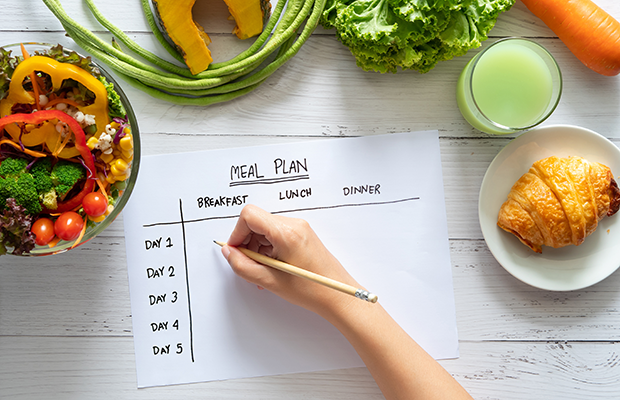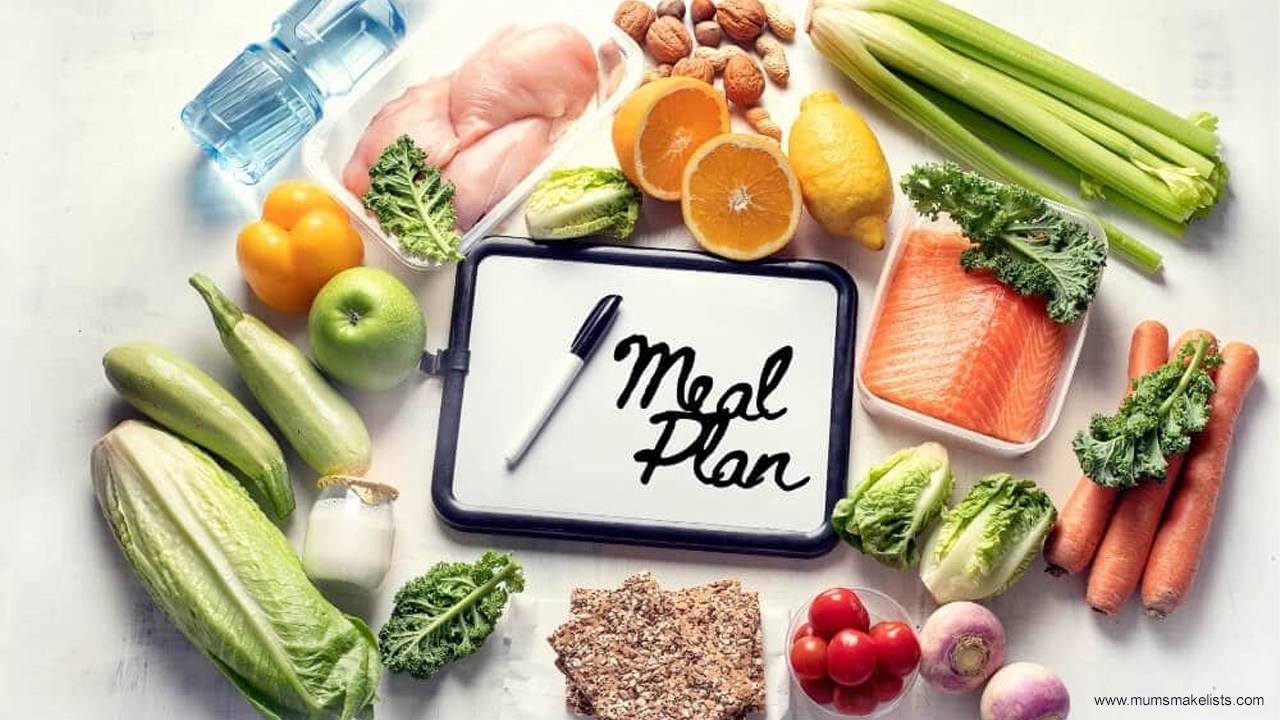Key Takeaways
- Prioritize balanced nutrition by incorporating a variety of fruits, vegetables, whole grains, and lean proteins into your meals.
- Embrace home cooking and meal prepping to save time and money while making healthier choices.
- Practice portion control and mindful eating to support weight management goals.
- Include plant-based meals to increase nutrient intake and diversify your diet.
- Read food labels and make informed choices while grocery shopping.
- Meal planning offers benefits such as time and money savings, reduced food waste, and improved overall health.

Benefits of Healthy Meal Planning
Healthy meal planning offers several benefits for improved health and well-being. By planning your meals in advance, you can ensure that you are consuming a balanced and nutritious diet. This can help you maintain a healthy weight, reduce the risk of chronic diseases, and improve your overall energy levels. Additionally, meal planning can save you time and money by reducing food waste and preventing the need for frequent takeout or unhealthy convenience foods. By having a well-thought-out meal plan, you can also reduce stress and make healthier food choices throughout the week. Overall, healthy meal planning is an essential aspect of maintaining a healthy lifestyle.
Another benefit of healthy meal planning is that it allows you to have control over your portion sizes. By pre-planning your meals, you can ensure that you are consuming appropriate portions and avoid overeating. This can be particularly helpful for individuals who are trying to lose weight or manage their calorie intake. By having a clear plan, you can also avoid mindless snacking or reaching for unhealthy food options when hunger strikes. Taking control of your portion sizes can contribute to improved health and weight management.
Key Components of a Balanced Meal
A balanced meal consists of several key components that provide your body with the necessary nutrients for optimal health. These components include:
1. Protein: Protein is essential for building and repairing tissues, as well as supporting muscle growth. Good sources of protein include lean meats, poultry, fish, eggs, dairy products, legumes, and tofu.
2. Healthy Carbohydrates: Carbohydrates are the body’s main source of energy. Opt for complex carbohydrates such as whole grains, fruits, vegetables, and legumes, which provide fiber and essential vitamins and minerals.
3. Healthy Fats: Healthy fats are important for brain function, hormone production, and nutrient absorption. Include sources of healthy fats like avocados, nuts, seeds, olive oil, and fatty fish in your meals.
4. Fiber: Fiber is crucial for digestive health and can help prevent constipation and promote a feeling of fullness. Include high-fiber foods such as whole grains, fruits, vegetables, and legumes in your meal plan.
5. Vitamins and Minerals: Ensure that your meals contain a variety of fruits and vegetables to obtain a range of vitamins and minerals that are essential for overall health.
By incorporating these key components into your meals, you can create a balanced and nutritious diet that supports improved health.
Simple Meal Prep Tips
Meal prep is a great way to save time and ensure that you have healthy meals ready to go throughout the week. Here are some simple meal prep tips to help you get started:
1. Plan Your Meals: Take some time each week to plan your meals and create a shopping list. This will help you stay organized and ensure that you have all the necessary ingredients on hand.
2. Batch Cook: Cook larger quantities of certain foods, such as grains, proteins, and roasted vegetables, and store them in separate containers. This makes it easy to mix and match ingredients for quick and easy meals.
3. Use Mason Jars: Mason jars are a convenient way to store salads, overnight oats, and other pre-portioned meals. Layer your ingredients in the jars and simply grab one when you’re ready to eat.
4. Pre-Cut and Wash Produce: Wash and cut up fruits and vegetables in advance, so they are ready to be used in recipes or enjoyed as snacks.
5. Invest in Storage Containers: Having a variety of storage containers in different sizes will make it easier to portion out and store your meals. Opt for glass containers, as they are microwave-safe and environmentally friendly.
By following these simple meal prep tips, you can save time, reduce food waste, and make healthier choices throughout the week.
Healthy Recipe Ideas

Looking for some healthy recipe ideas to incorporate into your meal plan? Here are a few suggestions:
1. Quinoa Salad with Roasted Vegetables: Toss cooked quinoa with a variety of roasted vegetables, such as bell peppers, zucchini, and sweet potatoes. Drizzle with a homemade vinaigrette for a nutritious and flavorful meal.
2. Baked Salmon with Lemon and Herbs: Season salmon fillets with lemon juice, fresh herbs, and a sprinkle of salt and pepper. Bake in the oven until cooked through and serve with steamed vegetables for a protein-packed dinner.
3. Chickpea Curry: Sauté onions, garlic, and spices in a pan, then add canned chickpeas and coconut milk. Simmer until heated through and serve over brown rice or quinoa for a satisfying and plant-based meal.
4. Greek Yogurt Parfait: Layer Greek yogurt, fresh berries, and granola in a glass for a quick and nutritious breakfast or snack.
5. Vegetable Stir-Fry: Sauté a variety of colorful vegetables in a pan with a drizzle of sesame oil and low-sodium soy sauce. Serve over brown rice or noodles for a delicious and veggie-packed dinner.
These are just a few healthy recipe ideas to get you started. Feel free to experiment with different ingredients and flavors to find meals that suit your taste preferences and dietary needs.
Creating a Sustainable Meal Planning Routine
Creating a sustainable meal planning routine is key to long-term success and improved health. Here are some tips to help you establish a routine that works for you:
1. Start Small: If you’re new to meal planning, start by planning just a few meals each week. As you become more comfortable, gradually increase the number of meals you plan.
2. Set Aside Time: Dedicate a specific time each week to plan your meals, create a shopping list, and do any necessary meal prep. This will help you stay organized and ensure that you have everything you need.
3. Get Creative: Don’t be afraid to try new recipes and experiment with different ingredients. This will help keep your meals exciting and prevent boredom.
4. Involve the Whole Family: If you’re cooking for a family, get input from everyone to ensure that the meals you plan are enjoyed by all. This can also help teach children about healthy eating habits.
5. Be Flexible: Remember that meal planning is a guide, not a strict rule. Be flexible and adapt your plan as needed based on your schedule and any unexpected events.
By following these tips, you can create a sustainable meal planning routine that supports improved health and well-being in the long run.
FAQ
What is the best meal plan for overall health?
When it comes to determining the best meal plan for overall health, it’s important to focus on balance, variety, and moderation. A meal plan that includes a wide range of nutrient-dense foods from all food groups is key to providing your body with the essential vitamins, minerals, and macronutrients it needs to thrive.
A Mediterranean-style diet, for example, is often touted as one of the best meal plans for overall health. This diet emphasizes whole grains, fruits, vegetables, legumes, nuts, seeds, and healthy fats like olive oil and fatty fish, while limiting red meat and processed foods. The Mediterranean diet is rich in antioxidants, fiber, and heart-healthy fats, which have been linked to reduced risk of chronic diseases such as heart disease, diabetes, and certain cancers.
Another approach to consider is the DASH (Dietary Approaches to Stop Hypertension) diet, which focuses on reducing sodium intake and increasing consumption of fruits, vegetables, whole grains, lean proteins, and low-fat dairy products. The DASH diet has been shown to lower blood pressure and improve heart health, making it a great option for those looking to support cardiovascular wellness through their diet.
Ultimately, the best meal plan for overall health is one that is tailored to your individual needs, preferences, and lifestyle. It’s important to consult with a healthcare provider or a registered dietitian to create a personalized meal plan that meets your specific health goals and dietary requirements. By prioritizing nutrient-dense foods, portion control, and mindful eating habits, you can create a meal plan that nourishes your body and promotes optimal health and well-being.
Conclusion
In conclusion, adopting healthy meal planning ideas can have a significant impact on improving overall health. By prioritizing balanced nutrition, incorporating wholesome ingredients, and practicing portion control, individuals can enhance their well-being and achieve their weight management goals. Embracing home cooking, meal prepping, and including plant-based meals can add variety and nutritional value to one’s diet. With the benefits of time and money savings, reduced food waste, and improved health, meal planning becomes a valuable tool for individuals seeking to make positive changes in their lifestyle and enhance their overall quality of life.
hope this article was helpful and for checkout our precious blog post by clinking here